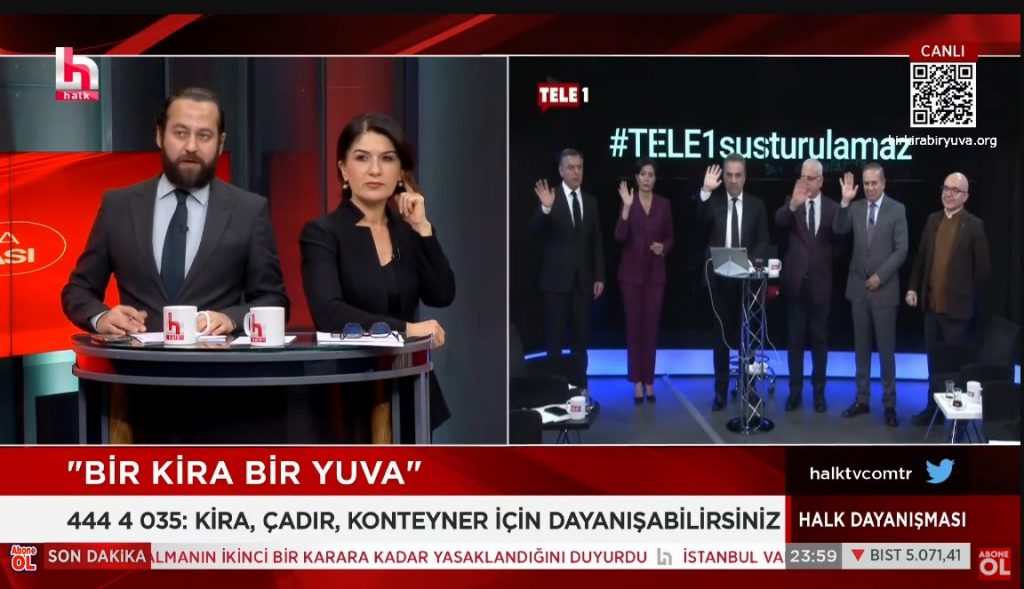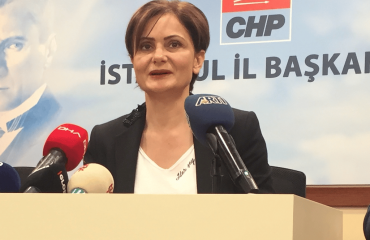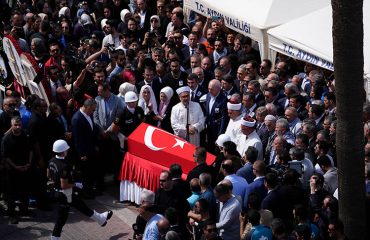

A few seconds after this screenshot were broadcast on Halk TV, Tele-1’s broadcast on the right side of the screen was cut off by the decision of RTÜK. The latest excuse for the crackdown on the press was that the channels were “preventing the free formation of opinion.” RTÜK imposed penalties on Halk TV, Tele-1, and Fox TV.
At their February 22 meeting, the Radio and Television Supreme Council (RTÜK) imposed broadcast suspensions and fines on Halk TV, Tele-1, and Fox TV for their earthquake coverage. On that evening, Halk TV was broadcasting a fundraiser to collect donations for tents and rental aid for earthquake victims.
As the day turned to February 23, Halk TV also broadcast the interruption to Tele-1’s broadcast and blackout of its screen live. It was a shameful spectacle and a new example of political pressure on press freedom in Türkiye.
When RTÜK punished Fox TV’s “Orta Sayfa,” their excuse – I can’t call it a reason – was that the show was “preventing the free formation of opinions.”
I say “excuse” because the AKP and MHP members, who form the majority in the RTÜK administration, know very well that our aim with the Orta Sayfa program, which we have been producing since November 2022 with Çiğdem Toker, Nevşin Mengü, and Deniz Zeyrek under the moderation of Doğan Şentürk, is precisely to contribute to the free opinion formation of viewers. They must have seen that Orta Sayfa quickly became Turkey’s most-watched talk show in a short time, based on the viewing rates that came before them.
Free opinion formation
Of course, we make mistakes, but our viewers are aware that these mistakes are not meant to mislead them and that they are promptly corrected when necessary; this is trust.
The AKP and MHP members of RTÜK, as well as the AKP media surveillance tools, are certainly aware that most of the pro-government TV channels’ shows that cannot go beyond the limits of bickering, shouting, and superficial debates are not watched.
That’s where the problem lies.
If not, they also know that a weekly TV show, no matter how many people watch it, can’t stop people from “forming an opinion freely.” However, they think that the more they can prevent news and comments from being exposed, the more profit they will gain.
Especially as President and AKP leader Recep Tayyip Erdoğan heads towards a critical election in which he is facing the possibility of losing his more than twenty-year-old rule.
Crisis, vulnerability, and earthquake
Turkey was heading into the elections already in the midst of an economic crisis that Erdoğan’s economic policy, which he insisted on defending, could not fix, and an administrative weakness caused by an overly centralised administration concentrated in Erdoğan’s hands. The earthquake disaster has piled on top of this like a nightmare; the death toll has risen to 43,556 as of February 23 morning, according to AFAD.
Leaving aside his previous election campaign, already limited by his previous successes, Erdoğan is trying to align the state’s primary duty of healing the earthquake victims’ wounds and finding shelter with the AKP’s election propaganda.
“AFAD, especially in the first two days, did not perform well. Minister of National Defense Hulusi Akar announced minute by minute that the military was ready to intervene within the first hour. Interior Minister Süleyman Soylu called for international aid, leaving aside the scepticism of “foreign powers.” However, the widespread involvement of the military in the debris removal efforts came only after citizen reactions and the President’s declaration of a State of Emergency.
For example, would questioning the share of this disorganisation in the high loss of life count as “preventing the free formation of opinion”?
The true obstacle to free opinion formation
Erdoğan wants to build the AKP’s election campaign around the repair and reconstruction activities that the state, regardless of which government is in power, is already obligated to undertake and will have to undertake after the earthquake, without any dissenting voices. The new slogan will be “We are building Turkey together.” But haven’t you already been building Turkey for the last 20 years, with contractors you keep close to you and who will immediately turn their backs on you if power changes?
Just looking at what Timur Soykan wrote in the BirGün newspaper on February 23 is enough to see the bitter consequences of the bribery-politics network crowned with zoning amnesties. Publishing these articles actually contributes to the free formation of opinion; the public’s right to information exists even if you try to prevent it.
But this is not only true for earthquakes. Remember the “disinformation” or censorship law that was passed using the excuse of publishing inflation estimates outside of the inflation figures announced by TÜİK before the earthquake hit.
But this does not only apply to earthquakes. Remember the “disinformation” law, or “censorship” law, as it is popularly known, which was enacted with the excuse that some independent researchers had been publishing inflation forecasts that contradicted the official announcements?
The more you try to ban things to limit freedom of speech and freedom of the press, the more you become the person who stops people from freely forming their own opinions.
If you’re uncomfortable with freedom of the press
Let me end the article with a quote from Mustafa Kemal Atatürk, the founding leader of our Republic, whose place in the hearts of the majority of the people still remains after a century, but whom some people cannot hide their hatred for:
“The means of removing the drawbacks that will arise from the freedom of the press is the freedom of the press itself.”
When Atatük said these words, there was no multi-party democracy in Turkey; therefore, these words are even more valuable and valid today.
If you are uncomfortable with freedom of the press, let the readers and viewers punish us by not reading or watching, not by your bans.

